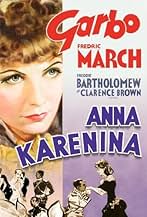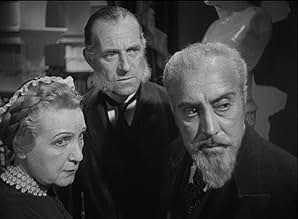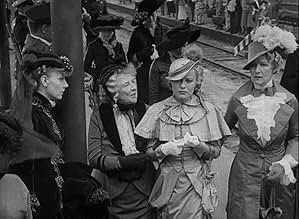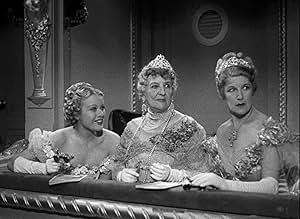Agrega una trama en tu idiomaThe married Anna Karenina falls in love with Count Vronsky despite her husband's refusal to grant a divorce, and both must contend with the social repercussions.The married Anna Karenina falls in love with Count Vronsky despite her husband's refusal to grant a divorce, and both must contend with the social repercussions.The married Anna Karenina falls in love with Count Vronsky despite her husband's refusal to grant a divorce, and both must contend with the social repercussions.
- Dirección
- Guionistas
- Elenco
- Premios
- 4 premios ganados en total
- Butler
- (as Joe E. Tozer)
Opiniones destacadas
Clarence Brown, the director, was a man who was instrumental in guiding Ms. Garbo's American career in the movies. First, as a cinematographer, then as a director, Mr. Brown, obviously, got the respect and confidence of his star, as it's clearly shown in the film.
Technically, this was a film that was well crafted. In fact, after seventy years it still has a crisp look, as shown in the great DVD version of the film. The great cinematography by William Daniels shows why this genius behind the camera was one of the best in the business. The splendor of the sets and the art direction by Cedric Gibbons added a rich texture to what comes out on the screen.
As Anna, Ms. Garbo does excellent work. As a matter of fact, her style shows some restraint as she doesn't go into those large gestures to punctuate a situation on a scene. The only thing that detracts from the film is Frederic March's Vronsky. While he was one of the best actors of his time, in here he is not as effective as in the rest of his screen work. In fact, their romance could have played differently had another actor been cast as the man who conquers Anna's heart.
The other principal roles are well played by a wonderful company that MGM put together to support the star. Basil Rathbone is perfect as Karenin, the dark figure in the novel. Freddie Bartholomew, the child actor, has some lovely moments when he is seen playing opposite Ms. Garbo. In fact, those scenes show well Anna's tender side, something that is in sharp contrast with what she ends up doing, abandoning this lovely child. Reginald Owen, one of the best character actors of the era is seen as Stiva with great charm. Maureen O'Sullivan is Kitty.
"Anna Karenina" is a film that will live forever because the combination of Greta Garbo's appeal and the great director Clarence Brown that understood her so well.
After a family reunion where Anna Karenina has a conversation with her sister-in-law Dolly (Phoebe Foster) to help to save Stiva's marriage, Anna is invited to stay for the ball. Anna Karenina is courted by Vronsky, but she decides to return to Saint Petersburg to her loveless marriage because of her beloved son Sergei (Freddie Bartholomew).
However Vronsky follows her and she introduces him to her husband Karenin (Basil Rathbone) at the train station. Vronsky woos her and soon they have a doomed love affair that will lead Anna Karenina to a tragic fate.
"Anna Karenina" (1935) is the first and the unforgettable version of Tolstoy's classic romance. Greta Garbor is perfect in the role of Anna Karenina, a beautiful and aristocratic married woman that falls in love with a man in a society repressive with the women's rights and feelings. The scene where her face appears in a cloud of steam is one of the most beautiful of the cinema history.
The grandiosity and the camera work of the initial scene showing the officer's table and the ball are still very impressive. The heartbreak conclusion of a woman destroyed by her love is very sad. My vote is eight.
Title (Brazil): "Anna Karenina"
¿Sabías que…?
- TriviaGreta Garbo initially formed a very close relationship with Freddie Bartholomew until the 11-year-old asked her for an autograph for his uncle one day. After that their relationship was strictly professional. For the rest of his life he was dismayed at suddenly losing her friendship.
- ErroresDuring the steeplechase, when Count Vronsky and his mount fail to make the jump, a segment from another race is edited into the film depicting the fall. In the film, Vronsky is wearing his white uniform jacket and dark pants and cap before and after the spill. The clip inserted depicts a jockey wearing white pants and dark silks.
- Citas
Vronsky: Our meetings are so brief, the dance also.
Anna Karenina: But our reunions are so frequent.
Vronsky: When I leave you, I'm lost in a world of strangers. When I touch your hand, we're alone.
Anna Karenina: [Smiling as she switches dance partners] I return you to the world!
- Versiones alternativasDespite all previous versions being intact, the 2006 UK Warner DVD was cut by seven seconds by the BBFC to remove footage of horse-falls.
- ConexionesFeatured in David O. Selznick: 'Your New Producer' (1935)
- Bandas sonorasNone But the Lonely Heart (Nur Wer die Sehnsucht Kennt)
(1869) (uncredited)
Music by Pyotr Ilyich Tchaikovsky ("Romance for Voice and Piano, Op. 6. No. 6)
Sergei's theme - played often in the score
Selecciones populares
Detalles
- Fecha de lanzamiento
- País de origen
- Sitio oficial
- Idioma
- También se conoce como
- Anna Karenina
- Locaciones de filmación
- Monterey Peninsula, California, Estados Unidos(Racetrack & Steeplechase scenes)
- Productora
- Ver más créditos de la compañía en IMDbPro
Taquilla
- Presupuesto
- USD 1,152,000 (estimado)
- Tiempo de ejecución1 hora 35 minutos
- Color
- Relación de aspecto
- 1.37 : 1
Contribuir a esta página


![Ver Trailer [EN]](https://m.media-amazon.com/images/M/MV5BNWEzOWNjMTYtZjhiZi00MThmLTliZmMtNDkxMDgyN2Q5ZWMxXkEyXkFqcGdeQXRyYW5zY29kZS13b3JrZmxvdw@@._V1_QL75_UX500_CR0)



































